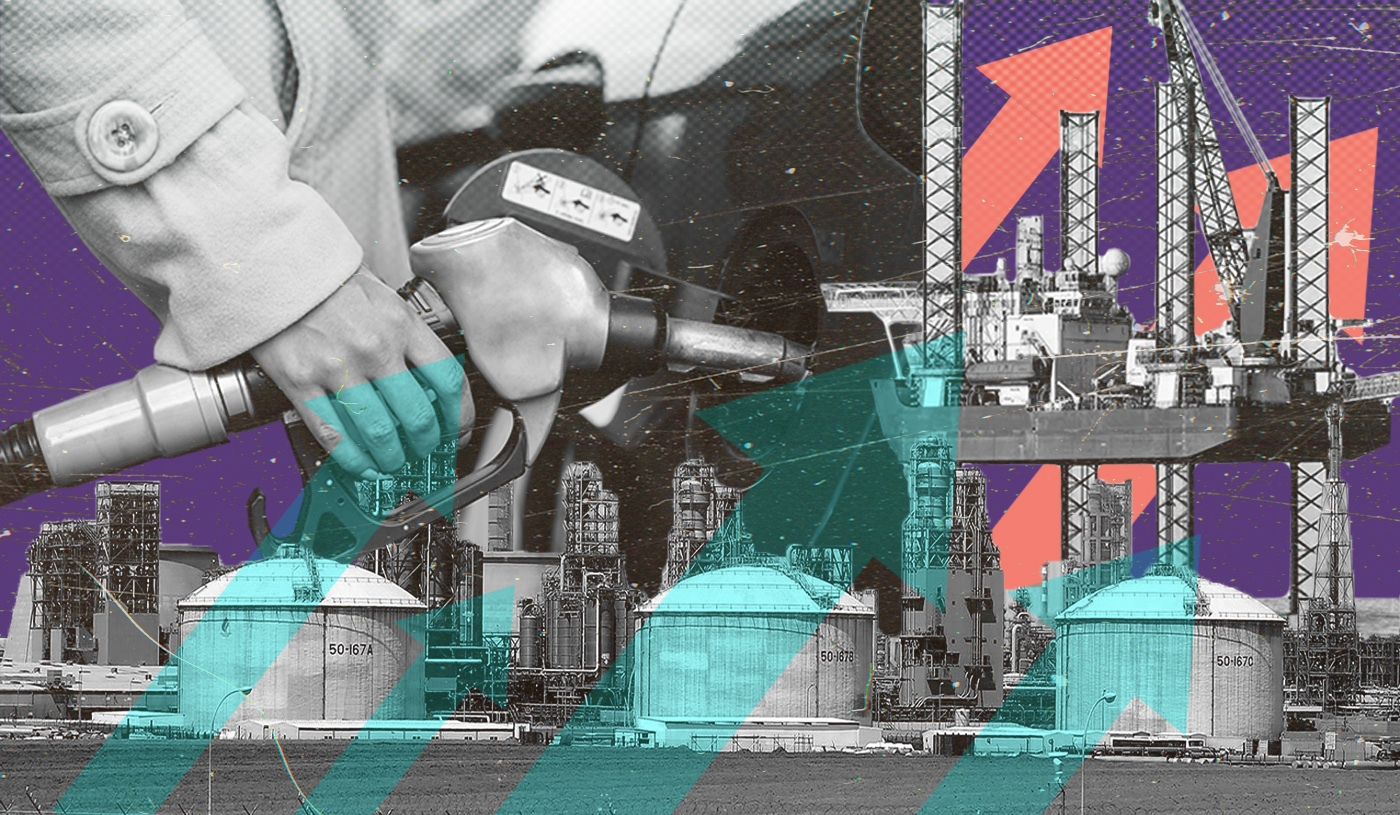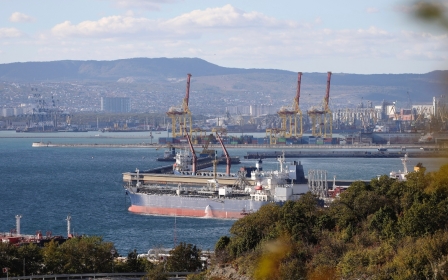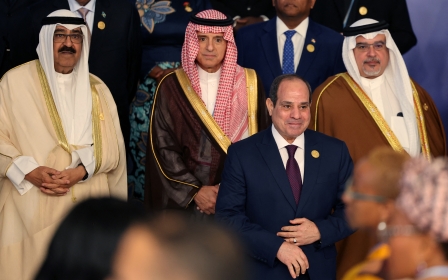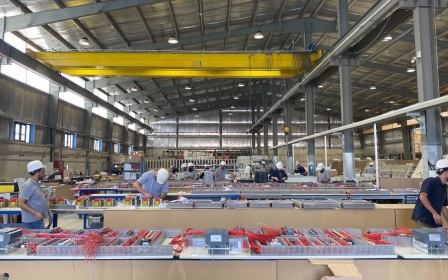Middle East primed to pounce when EU bans Russian diesel

The Middle East is set to deepen its foothold in Europe’s energy market when a ban on Russian diesel and petroleum products kicks in on 5 February, bolstered by new refineries, favourable geography and potentially, additional shipments of Russian product.
Europe has rushed to stockpile diesel ahead of the ban, even increasing purchases from Moscow before its largest external supplier is cut off, in a bid to prevent shortages of the fuel which is a lifeblood for the farming, construction, manufacturing and transportation industries.
“The Middle East turns out to be a big winner to replace Russian material in Europe,” Ed Morse, the global head of commodities research at Citigroup, told Middle East Eye. “And then further benefit from it by importing Russian material themselves.”
'Sprinkle it Salt Bae style with a few drops of someone else’s diesel, it’s no longer Russian'
- Viktor Katona, Kpler
Gulf states have already traded places with Russia in the crude market, redirecting sales to Europe, while Moscow muscles in on their traditional customers in Asia with cut-rate prices.
The global energy trade's rewiring is a result of western penalties imposed over Russia's invasion of Ukraine.
New MEE newsletter: Jerusalem Dispatch
Sign up to get the latest insights and analysis on Israel-Palestine, alongside Turkey Unpacked and other MEE newsletters
On 5 December, EU states banned Russian crude and G-7 countries instituted a $60 per barrel price cap. While Europe largely managed to wean itself off raw Russian oil ahead of the ban, it has continued to rely on it for refined products like diesel.
Before the war in Ukraine, Russia accounted for about half of Europe’s diesel imports. In December, the EU and UK purchased 663,000 barrels per day (bpd) of Russian diesel - about 40 percent of total seaborne shipments -underscoring the supply crunch the bloc faces in less than three weeks.
Gulf exports of crude, along with refined products like diesel, fuel oil and jet fuel to Europe have surged in early 2023, as the EU scours the market for new suppliers.
In the first 12 days of 2023, the UAE exported 133,000 bpd of petroleum and related products to Europe, breaking monthly records for January since 2017, according to data shared with MEE by Kpler, a firm that tracks petroleum shipping. Saudi Arabia's exports of 282,000 bpd in the same time period surpass entire January levels since 2019.
The diesel ban comes at a fortuitous time for Gulf states, just as they prepare to roll out a slew of new mega-refineries.
Kuwait is especially well-placed to capitalise on the ban, Morse from Citigroup says.
The tiny emirate is ramping up production at its new al-Zour refinery - one of the largest oil refineries in the world - which will have the capacity to process 615,000 barrels of crude a day when it is fully operational. In November, Kuwait shipped its first batch of jet fuel from the site.
"They are prepared with new refining capacity to sell diesel into Europe...and actively take market share," Morse said.
Kuwait’s diesel sales to Europe in the first 12 days of January underscore how Gulf producers have pounced on disruptions in the global energy market to boost exports.
''The ultimate truth is that oil products are fungible'
- Clay Seigle, Rapidan Energy Group
Monthly diesel exports from Kuwait to Europe stood at 59,000 bpd as of 12 January, almost triple the levels for all of January 2022, and about 900 percent more than January 2021, according to Kpler.
Saudi Arabia is ramping up its Jazan refinery, which is expected to produce more than 200,000 bpd of diesel when it reaches full capacity later this year. Oman's Duqm refinery is also slated to open at the end of 2023. Analysts say it will increase the sultanate's ability to refine crude into diesel and other fuels by about 200,000 bpd.
Despite the Middle East’s new heft, analysts warn Europe will have to turn to a multitude of fuel suppliers, including the US and India, to fill Russia’s void. Middle Eastern diesel imports into Europe peaked in September at 500,000 bpd, but were still below the continent's normal flow from Russia.
“For the Middle East to fully displace all Russian diesel going to Europe, it would require a massive redirection of flows away from other, non-European receivers of Middle East diesel,” Jay Maroo, lead crude analyst at Vortexa, told MEE.
“What is more likely to happen is a rise in supplies to Europe from multiple exporters,” he added.
'Sprinkle it like Salt Bae'
The Middle East may also buy shunned Russian products on the cheap and re-export them, putting the region in a sweet spot to play both sides of the looming ban, analysts say.
This past summer, Saudi Arabia gorged on cheap Russian fuel oil, allowing crude the kingdom normally uses for domestic needs - like running air conditioners - to be exported at higher prices abroad.
“The ultimate truth is that oil products are fungible,” Clay Seigle, director of global oil service at Rapidan Energy Group, told MEE. “If you use some, that frees up others to be diverted elsewhere.”
Egypt, a small-time energy producer compared to Saudi Arabia, has also jumped into the game. Cairo imported record levels of Russian fuel and furnace oil last year, re-exporting much of it to Saudi Arabia but also burning it at home to free up natural gas for export.
'I don't see Turkey able to play a middleman role buying cheap Russian oil'
- Gregory Gause, Texas A&M University
“With the February 5 ban, there are more opportunities for that kind of displacement or substitution,” Seigle said.
Tunisia offers a vivid example of the cottage industry that has sprung up "washing" Russian material, where petroleum products are imported and then relabelled under a different country of origin to make them more palatable.
The energy-poor North African country started importing huge quantities of Russian naphtha in August. Imports of the liquid hydrocarbon peaked at 61,000 bpd in October, up from zero the previous years, according to Kpler. The Naptha was re-exported abroad, mainly to South Korea.
Tunisia is the "transhipment story in real life", Viktor Katona, an analyst at Kpler, told MEE. Transhipment is the process where goods are unloaded from one ship and loaded onto another ship to complete the journey.
Katona predicts the Tunisia model will be replicated across North Africa once the EU’s diesel ban and G-7 price cap on petroleum products takes effect. Russia is already ramping up diesel shipments to Morocco.
“These countries are on the Mediterranean where shipping voyages to Europe are short,” he said. “I can see a lot of symbiotic relationships between the Russians and North African countries.”
Those best placed to capitalise on transhipment have big storage facilities, analysts and traders say. Egypt has such terminals at the ports of Ain Sokhna and Sidi Kerir, and the UAE has Fujairah. Russia's state-owned energy giant Lukoil moved its trading operations to Dubai last year.
According to EU rules, Russian crude must be “substantially transformed” in order to be exempt from sanctions. Technically, blending Russian diesel with another batch may not skirt the ban, but analysts say the rules are opaque, and in practice, it's difficult to trace diesel's origin.
“In effect, if you take a cargo of Russian diesel into Algeria or Egypt and sprinkle it Salt Bae style with a few drops of someone else’s diesel, it’s no longer Russian,” Katona said, in reference to the famed Turkish cook's practice of sprinkling salt.
Seigle, from Rapidan energy, said western regulators are unlikely to track such activity because the aim of sanctions is to limit Moscow’s ability to profit from petroleum sales while keeping Russian supplies on the market.
“If enough Russian volumes go un-purchased, and Russia is forced to reduce production, then some Russian gas oil could be removed from the market," he said. "The interest of western governments is to prevent a major price spike."
'So that we can come in'
The potential to make lucrative returns repackaging Russian products could also draw in Turkey, which has already emerged as one of the top buyers of shunned Russian oil.
In December, Russia exported 175,000 bpd of diesel to Turkey, a record high according to Kpler data since 2018. So far, the Russian intake has not corresponded with a subsequent rise in Turkish diesel exports, but that could change with more Russian diesel flowing to Turkey this month.
“Turkey says it wants to position itself as a transhipment hub for Russian gas, but it could be a huge transhipment hub for Russian crude products with its Aegean refineries,” Katona said.
'The Middle East turns out to be a big winner to replace Russian material in Europe'
- Ed Morse, Citigroup
But Ankara’s reliance on Russia for supply, like other potential hubs that lack oil reserves, might be too blatant a play for European countries looking to go cold Turkey on the Kremlin's offerings. Buyers could also be turned off by market uncertainty.
“I don't see Turkey able to play a middleman role buying cheap Russian oil and product,” Gregory Gause, an expert in Middle Eastern politics at Texas A&M University, told MEE.
“The Russians could get mad at the Turks and simply not sell them oil. That is the Russian playbook. Where would that leave buyers?" he added.
The big winners of Europe’s energy divorce from Russia are traditional Gulf petrostates, as the diesel ban “reinforces” their status as a linchpin in the global oil market, Gause said. It's a development that may have geopolitical and economic implications as the EU moves to deepen ties with the Arab monarchies.
German Chancellor Olaf Scholz visited Saudi Arabia, the UAE and Qatar as part of a grand Gulf tour in September to secure energy shipments. On Wednesday, the German leader told Bloomberg he believed Europe's largest economy would avoid a much-anticipated recession thanks to Berlin locking in new suppliers.
Gulf investments in Europe may serve as a metric for the durability of this new era of rewired fuel flows.
“Traditionally the Saudis have made investments in refining in regions where they sell their crude,” Gause said, pointing to projects in Asia as an example.
Some early signs have emerged. In November, Aramco completed three deals with a Polish refiner and fuel retailer. In one acquisition, which materialised just before the war in Ukraine erupted, the Saudi state-owned oil giant gained a 30 percent stake in Poland's second-largest refinery.
"The investments will widen Aramco’s presence in the European downstream sector and further expand its crude imports into Poland," the company said in a press statement on 12 January.
Gulf states have traditionally shied away from Europe, which they view as a declining oil market with ageing populations and lofty green energy goals, as opposed to Asia. Europe has also put more red tape around fossil fuel investments, but with Russia’s invasion, both have been forced to make a U-turn.
In October, Saudi Energy Minister Prince Abdulaziz bin Salman said the kingdom was eyeing more sales to Europe.
“We are engaged with so many governments. Just to give you an example, Germany, Poland, the Czech Republic, Croatia, Romania and others. They are going through a phase of debottlenecking their supply chains and supply systems to ensure that we can come in.”
This article is available in French on Middle East Eye French edition.
Middle East Eye delivers independent and unrivalled coverage and analysis of the Middle East, North Africa and beyond. To learn more about republishing this content and the associated fees, please fill out this form. More about MEE can be found here.




